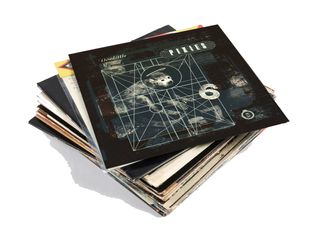
The Pixies' classic Doolittle - track-by-track
“We didn’t feel like we were making a masterpiece,” says Pixies drummer Dave Lovering of the group’s beloved 1989 album Doolittle. “I guess I can see that it’s a classic now. At the time of its release, I just thought of it as another Pixies album. It was the next thing we were doing.”
Following the abrasive, straight ahead Steve Albini-produced Surfer Rosa (“Still probably my favorite of everything we’ve done,” says Lovering), the Boston-based Pixies – singer-guitarist Black Francis (real name, Charles Thompson aka Frank Black), bassist-singer Kim Deal, guitarist Joey Santiago and Lovering – chose the British-born Gil Norton to helm their major label debut.
“When we did Doolittle with Gil, the production became more polished and pro,” Lovering recalls. “The songs were more accessible, too, which just might have been where we were going as a band. Not to say that I didn’t like it; in fact, I was extremely proud of Doolittle when I first heard it being played back. I couldn’t believe it was us – it sounded so big and accomplished.”
A riveting, eclectic mix of genres, spanning the gamut from primal scream punk fury to avant-garde noise rock to twisted homages to surf pop, spaghetti westerns, country and reggae (to say nothing of the lyrical references – Luis Bunuel, anyone?), Doolittle was an immediate hit with critics and something of a non-starter with the public.
Although the Pixies broke up acrimoniously in 1993, groups like Nirvana, Radiohead, Weezer and dozens more cited them as influences; the loud-quiet-loud aesthetic, prominently rendered on Doolittle, was a much-copied musical dynamic. “Hearing that kind of praise was pretty astonishing,” says Lovering. “I would say those bands were very responsible for us reuniting in 2004. A lot of the kids who liked them listened to what they said and turned to us, so we owe a big debt of gratitude to those bands.”
Since 2009, the Pixies have been on what the drummer describes as “an ongoing Doolittle tour,” and later this year they’ll hit the road once again to perform the disc live in its entirety in both major and secondary markets in the US.
On the following pages, David Lovering takes a track-by-track look at Doolittle, offering his thoughts on making the seminal recording and describing what it feels like to perform the songs today. “It’s a great record,” he says. “After all these years, it’s like it hasn’t aged. Time sort of caught up with it.”
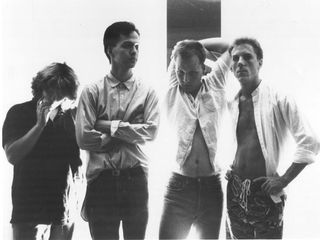
Debaser
“I remember it was a fun song to play in the studio, very easy and straightforward. I’m pretty sure I played my Tama Artstar II kit during these sessions. I bought it during the Surfer Rosa album. A great sounding set, probably my favorite kit of all time. It met its demise in a car accident, unfortunately. I bought a Pearl kit after that, which I liked, but there was something special about that Artstar set.
“Thematically, the song sums up the album for a lot of people, maybe because it’s the first cut on the record. All I know is that when we go out and kick off things off with it, the crowd goes crazy.
“I’ve always loved Kim’s bassline. It’s a great part, very hooky. She’s a real stickler for the timing. I know she’ll start the song out her way and I’ll come flying out of the gate and make it go just a little bit faster. I love the energy, but she holds her ground. It’s a little push-pull thing we have together.”
Listen: Pixies - Debaser
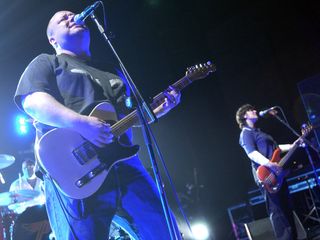
Tame
“It’s probably my favorite song on the record to play. It’s full of angst, kind of punky. Even though it’s in a slightly odd time, it’s quick and moving, so I get to go all out on it.
“As a drummer, you don’t always pay attention to every element of a song – you’re reacting to what the other people in the band are doing. But this one was always a fun experience. Even back in the day when we recorded it, I always loved it. It’s so mean and aggressive – how can you not like that?”
Listen: Pixies - Tame

Wave Of Mutilation
“The song is very un-Pixies-like. It’s so gentle and dreamy, almost like a cloud in the sky passing over you. We did a fast version and we did a slow version, although I don’t remember which one came first.
“Musically, the drums are probably the hardest-sounding elements on the track. I used drum mallets on the floor tom and the snare when we cut it. The guitars are nice and floating – I really like the way they drift around the other instruments.
“It’s an easy song to play, but it’s very effective in the way it grabs people. It’s got a very odd, arresting spirit. There's nothing else that sounds quite like it.”
Listen: Pixies - Wave Of Mutilation

I Bleed
“It’s a pretty crazy song. It starts off a little slow, and then it goes completely nuts in the chorus. Come to think of it, some of out other songs do that, too!
“If I remember correctly, coming up with the beat was a little tricky. I was working mainly off the hi-hat, so I was using a different kind of sticking. Figuring out the little patterns and fills and certain dynamics took me a while to get down. And, of course, I had to relearn it when we got together again in 2004."
Listen: Pixies - I Bleed
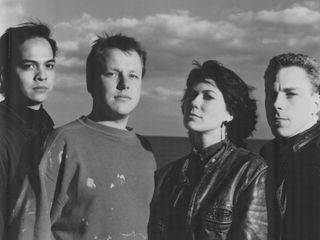
Here Comes Your Man
“We used to play this when we first got together. It was a very old song, and we made a demo of it very early on, but for some reason we didn’t include it on Come On Pilgrim or Surfer Rosa. By the time we got around to Doolittle, we said, ‘Hey, let’s rerecord Here Comes Your Man.’
“Funnily enough, we never played it until 2004. We always thought it was too poppy – which is probably why it got played on the radio and MTV. I guess we were just trying to keep our coolness; we didn’t want to give in too easily. But when we got back together, we came around to playing it.
“Actually, I’m still working on it. I know it sounds like a very simple song, but there's a feel to it that has to be just right, and I’m not happy with what I’m doing on my kick drum. The audience can’t tell, but I’m always changing my pattern slightly. I think it can groove more. I’ll get there.”
Listen: Pixies - Here Comes Your Man

Dead
“This one's pretty interesting. We came up with it in parts, and then when we worked with Gil in the studio, we figured out the bridge and end part where I switch to ride and there's a cool guitar lead.
“We might have changed the timing on it from the way it originated to the finished version. I recall there being a lot of thought put into the tempo – I think it was a little faster at first, and then we slowed it down a little, which seemed to suit it just fine.
“I was always impressed by Charles’ singing here, just the way he screams ‘Dead!’, he’s so intense. When we play the song live, he really lets go. He's careful, tough. He does vocal warm-ups backstage before we go on. He knows this is one of those songs that can wreck his voice.”
Listen: Pixies - Dead
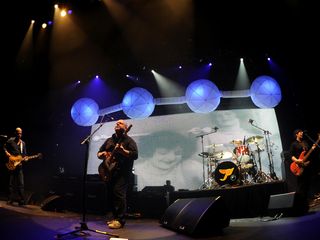
Monkey Gone To Heaven
“One of my favorites. When we were writing Doolitle, that song was pretty obvious to us as ‘Hey, we’ve got something really great here.’ Because oftentimes you don’t know – you think something is good, but you can never tell if other people will like it, not that we tried to pander, really. But we did think there was something special to Monkey Gone To Heaven.
“It was a quick song to put together. It might have been the smoothest one to take shape in the studio. We hired four string players to come in and add texture, and they made it sound grand and epic.
“At one time, we had a keyboard player on stage with us who did string parts. We don’t do that now, although I do play the tambourine on it. It sounds complete on stage the way we do it. I love playing it.”
Listen: Pixies - Monkey Gone To Heaven
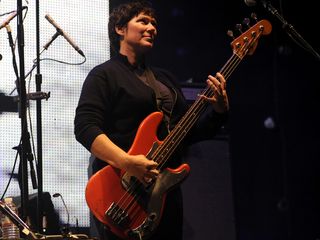
Mr Grieves
“Coming up with it was like going back to our older, harder punky style. It was a nod back to our club days where we had to go kind of all-out. To me, it almost sounds like it could have been on Surfer Rosa.
“Kim and I have a great time playing this one live. There’s a part in the song where I'm doing almost a half-time thing, but I'm still trying to match the kick up with her bass. We’re always looking at each other trying to roll with it. We have a good time with Mr Grieves.”
Listen: Pixies - Mr Grieves

Crackity Jones
"I've always loved its energy, its all-out, half-time punk feel. It's mean, it's hard, it's full-on barreling through. I have a great time playing it live. I'm riding on the cymbals and I end it with a cymbal choke - fun stuff!
"This is another song where Kim and I play off of each other really well. Because the song is so fast moving, we go at it with everything we've got. We lock up beautifully, but we go have to pay close attention to what the other person is doing.
"Back in the old days, this was a big mosh pit song. Funnily enough, occasionally, it can still get a mosh going sometimes. It doesn't happen that often, but every now and then it happens. That's pretty amazing."
Listen: Pixies - Crackity Jones
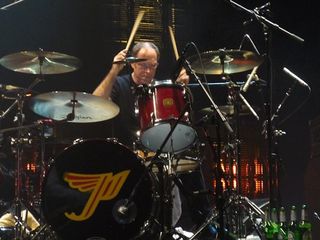
La La Love You
“We worked the song up, and then Charles turned to me and said, 'Why don’t you sing it? It might be good to get another voice on the record.’ Which was pretty funny because I had never sung on anything before.
“I remember going into the vocal booth, feeling pretty nervous about the whole thing. I probably had about three or four shots of whiskey just to calm my nerves. In fact, if you listen closely to the recording, you can hear me kicking over some bottles – there’s a little bit of clanking going on.
“But I pulled it off. In fact, I’ve even had people come up to me and tell me they’ve used it as their wedding song, which is a nice compliment. Live, it’s tricky: I’m not one of those drummers who can play and sing effortlessly. I’m huffing and puffing a little, trying to keep my air flowing. So I pull back on the drums and play the song more reserved than I would if I wasn’t singing.”
Listen: Pixies - La La Love You
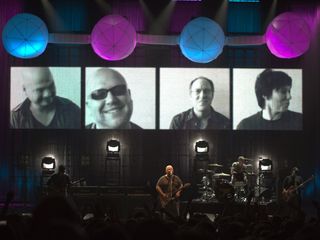
No. 13 Baby
“This song came out of nowhere. When we recorded it, we could tell it had a nice groove, so we kept extending it.
“Live, we have a great time playing it. When that groove section comes up, we really go for it. I just keep it going and going and going. People in the audience are expecting it to end, and we like making a bit of joke out of it – we keep faking them out and not ending it.
“I don’t know if everybody in the crowd appreciates us doing that, but you have to keep people guessing sometimes. Plus, we have a light show going on behind us, so it becomes a bit of a spectacle.”
Listen: Pixies - No. 13 Baby

There Goes My Gun
“Although everybody else seemed to have a pretty easy time recording this song, I had some issues with it on the drums. I had to work on it a while to get my parts right. Doolittle wasn’t always a one-take record, at least not for me.
“Live, I’ve had a lot of those same issues, actually. There’s one part in the chorus where I’m hitting the toms and doing a double-kick pattern while then hitting the snare. It’s easy as pie, but live I have problems with my sticking. I don’t get it as smooth as I would like. So I’m still experimenting with it to try to figure out the best way to play it.
"On stage, it’s cool to watch Joe play this song. He starts it out with that great sustained guitar part. Some nights he plays it just like it is on the record, but other nights he makes it go on and on, really exaggerating it and having fun with it. I enjoy watching that.”
Listen: Pixies - There Goes My Gun

Hey
“This was the only song that was recorded totally live, with no overdubs at all. It was an old song for us at the time – not as old as Here Comes Your Man, but we knew it inside and out. The emotions were very pure and joyous as we cut it. We went in, knocked it out and looked at each other: ‘Hey... done!’
“Audiences really love the song. I don’t play it exactly like it is on the record. There’s a little breakdown section with just the snare and the kick. I know I do it differently, but I haven’t actually sat down with the CD to see what I originally did. I probably should so I can correct my approach. On the other hand, what I’m doing works, so I don’t know if I want to change it.”
Listen: Pixies - Hey

Silver
“We were on the road in Europe when Silver was written. It was a Charles and Kim composition. It’s a very simple song, just bass and acoustic guitar and me playing the kick drum. I think we threw on an octave divider on the kick to make it sound even lower.
“I played bass on the track, too. I always enjoyed playing the bass, so I piped up one day and said, ‘Hey, let me do this one.’ It’s not a virtuoso display of chops – it’s pretty much me going, ‘Bonnnng! Bonnnng!’ Maybe I throw another note in there somewhere.
“That’s another song we never played in concert until the Doolittle tour around the anniversary came up. We all had to relearn it. It’s not a dirge, but it’s slow and it’s in 3/4 tempo. Everybody has their own idea of what 3/4 tempo really means, so I kind of follow Charles and anticipate what he’s doing.”
Listen: Pixies - Silver
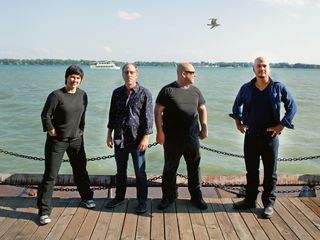
Gouge Away
“It’s the perfect example of a true Pixies song. It’s got the quiet verse and then it goes all-out for the chorus. The way it’s structured, it’s two opposing layers. I remember when we recorded it, I thought it was the most compelling thing we ever did.
“Since it’s the last song on the album, it’s the last one we play live, so it’s kind of a signifier for me – I know we’re coming to the end of the set.
“The crowd loves it. When we go into the dynamics, the response is really something. It’s a total release for everybody, a fantastic way to finish the night.”
Listen: Pixies - Gouge Away

Joe is a freelance journalist who has, over the past few decades, interviewed hundreds of guitarists for Guitar World, Guitar Player, MusicRadar and Classic Rock. He is also a former editor of Guitar World, contributing writer for Guitar Aficionado and VP of A&R for Island Records. He’s an enthusiastic guitarist, but he’s nowhere near the likes of the people he interviews. Surprisingly, his skills are more suited to the drums. If you need a drummer for your Beatles tribute band, look him up.

"It may have bothered him that people didn’t recognise his guitar virtuosity, which might be why the song devotes so much space to his shredding": A music professor breaks down the theory behind Prince's When Doves Cry

“It didn’t even represent what we were doing. Even the guitar solo has no business being in that song”: Gwen Stefani on the No Doubt song that “changed everything” after it became their biggest hit

"It may have bothered him that people didn’t recognise his guitar virtuosity, which might be why the song devotes so much space to his shredding": A music professor breaks down the theory behind Prince's When Doves Cry

“It didn’t even represent what we were doing. Even the guitar solo has no business being in that song”: Gwen Stefani on the No Doubt song that “changed everything” after it became their biggest hit
Most Popular








